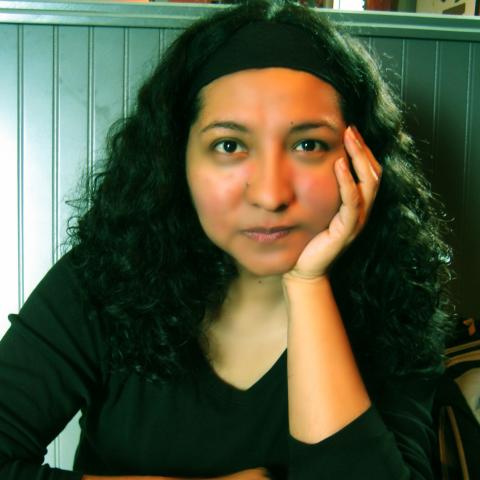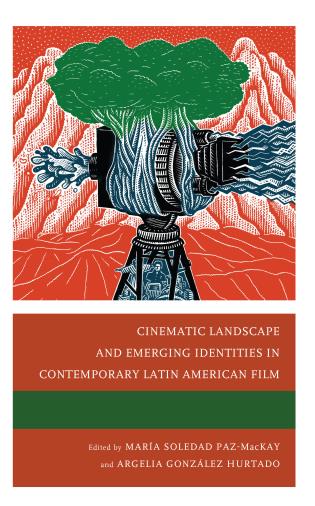Associate Professor of Spanish | WGSX Coordinator

Biography
Argelia González Hurtado is an associate professor of Spanish and Latin American Studies at St. Mary´s College of Maryland. She received her Ph.D. in Spanish & Latin American Studies from the University of Alberta in Canada. Her academic interests include Mexico’s cultural production, Latin American Cinema, Indigenous Media, and Visual and Popular Culture. Her primary research focuses on the cinematic depiction of indigenous communities during different periods of Latin American history. One specific objective of her work is to discuss how productions made by the indigenous media-makers in Latin America create a space of confrontation and dialogue between the long history of representations about Indianness that were built by the national culture and the construction of Indiannessmade from the perspective of Amerindian knowledge. Currently, she is developing a research project titled Cultural Production through Indigenous Women’s Gaze: Media and New Media, which focuses on cultural production in media and new media by Indigenous women in Canada, the United States, and Mexico. The project will explore the strategies employed by a selected group of Indigenous female artists to reclaim not only representations of women but also Indigenous knowledge, stories, and histories.
Gonzalez Hurtado had been an active member of the Steering Committee of the Women, Gender, and Sexuality Studies Program. Since 2019, she has been a member of the council for the Film section of the Latin American Studies Association (LASA). She is the current co-chair of the section.
Argelia is also active in media production. She was co-founder and editor of the online magazine La guagua cultural for the Latino community in Edmonton, Canada. She is the producer of the short films Distant Altars (2018), Hidden Gods (2014), The Last Deaths of Joe (2012), and The Seed (2008).
Areas of Research Specialization
- Indigenous media
- Latin American cinema
- Visual and popular culture in Latin America
Areas of Teaching Specialization
- All levels of Spanish language
- Indigenous cultures
- Latin American cinema
- Digital storytelling
- Latin American women writers and filmmakers
- Indigenous Latinx visual culture
Internal Affiliations
Education
-
B.A. in Arts Communication Sciences at Instituto Tecnológico y de Estudios Superiores de Monterrey,
-
M.A. in Communication at Instituto Tecnológico y de Estudios Superiores de Monterrey,
-
Ph.D. in Spanish and Latin American Studies at University of Alberta,
Awards
- Aldom-Plansoen Honors College Professorship, 2024
The Aldom-Plansoen Honors College Professorship is granted to associate professors for a two-year term. In honor of recent professional accomplishments and promising developing research, outstanding mid-career faculty are rewarded with funds to sustain and enrich their scholarly contributions. The award is generously supported by the Aldom-Plansoen Endowment established in 1999 by Jarrod Aldom ’97 and John Plansoen.
- Pandion haliaetus Professorship, St. Mary’s College of Maryland
- Insight Development Grant, Social Sciences and Humanities Research Council of Canada.
Project: “Rediscovering Rural Landscape and Visualizing Emerging Identities in 21st Century Argentinian and Mexican Cinema.” Co-applicant with Maria Paz-Mackay, St. Francis Xavier University. 2021-2024
- FY21 Sponsored Research Go-Getter Award, St. Mary’s College of Maryland
Spotlight
- “Michel Franco’s Después de Lucía (2012): A Portrait of a Bullied Adolescent”
Chapter appearing in Politics of Children in Latin American Film. Ed. Maria Paz-Mackay, Omar Rodríguez. Lexington Books, 2019
- “Narrating the Diaspora: Taraspanglish Video Project”
Chapter appearing in Adjusting the Lens. Community and Collaborative Video in Mexico. Eds. Freya Schiwy and Byrt Wammack Weber. Pittsburgh: University of Pittsburgh Press, 2017
- “Resistance and Revival: Indigenous Women Media-Makers in Contemporary Mexico.”
The article is part of a special issue focused on gender, sexuality, film, and media in Latin America. In the article, González Hurtado analyzes the documentaries “Voladora” ("Flying Woman," 2008), by Chloé Campero; “La vida de la mujer en resistencia” ("We Are Equal," 2004), produced by Chiapas Media Project–Promedios; and “La rebelión de las oaxaqueñas” ("The Oaxaqueña Rebellion," 2008), produced by Mal de Ojo TV.
These films are case studies of female Indigenous resistance through the media in Mexico. González Hurtado points out that the contributions of Indigenous women are linked to the transformation of the ‘nation,’ either the Indigenous or the Mexican. She argues that these female media-makers are guardians of their cultural heritage and pioneers in opening up new cultural spaces while challenging indigenous and women’s marginalization.
“Resistance and Revival: Indigenous Women Media-Makers in Contemporary Mexico.” Latin American Perspectives. vol. 48, no. 2, Mar. 2021, pp. 63–76.
- “Indigenous Latinx Identity and Media.”
The chapter is included in the textbook Latinx Media. This open-access textbook explores film, TV, and digital media created by and about the Latinx community, introducing core concepts in media studies.
Latinx Media: An Open-Access Textbook. Edited by Rielle Navitski and Leslie Marsh. University of North Georgia Press, 2021.
- Cinematic Landscape and Emerging Identities in Contemporary Latin American Film
Cinematic Landscape and Emerging Identities in Contemporary Latin American Film, María Soledad Paz-Mackay and Argelia Gonzalez Hurtado, Eds. (Lexington Books, 2024).

